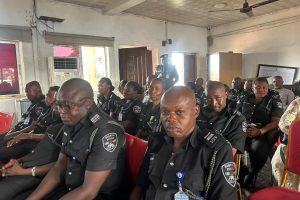30m bags of NPK fertiliser delivered to Nigerian farmers – Osinbajo
Vice-President Yemi Osinbajo said the Presidential Fertiliser Initiative (PFI), has delivered over 30 million 50kg bags of NPK fertiliser to Nigerian farmers from 2017 to 2021.
Osinbajo’s spokesman, Laolu Akande, in a statement on Friday in Abuja, said the vice-president inaugurated Pandagric Novum Farms, an integrated feed and food manufacturing company in Panda community, Karu LGA, Nasarawa State.
The Nigeria Sovereign Investment Authority (NSIA) and Signature Agri-Investments are major investors in the project.
He said that President Muhammadu Buhari enlisted NSIA as the project implementing entity of PFI, which was restructured in 2022.
The vice-president said that the Federal Government would continue to create the enabling environment to encourage more private sector investments in the agricultural sector.
He called for more private sector investments in the agricultural sector.
Osinbajo said that that the project’s inauguration was a foretaste of many possibilities and opportunities for investments, in agriculture and other sectors in the country.
He said: “What you see today confirms that there is opportunity in Nigeria for investments in agriculture.
“While government commits to creating an enabling environment, we will look to the private sector for the investments to galvanise growth in the sector.
“We must indeed, work together to re-define agriculture for the future in Nigeria.’’
Osinbajo said that Buhari passionately believed in the role of the country’s agricultural sector as a key driver of job creation and economic growth.
He cited instances in different sub-sectors of the agriculture value chain where the NSIA, as part of its key mandates, had invested in over the last 10 years.
Osinbajo said: “One of these investments is PFI, which was established by Buhari in 2016 to address the problem of cost and availability of fertiliser.
“Over its five-year run (2017 -2021), the programme had delivered over 30 million 50kg bags of NPK 20:10:10 fertiliser to Nigerian farmers and resuscitated the fertiliser blending industry.
“It had revived over 60 otherwise moribund plants scattered across the country, created hundreds of thousands of direct and indirect jobs.
”It had also enabled government to conserve foreign exchange by import substitution amounting to over 100million dollars.
“With the sector now reactivated, the NSIA’s role in the fertiliser value chain has moved upstream.’’
Osinbajo also highlighted the Fund for Agricultural Finance in Nigeria (FAFIN) which was established by the NSIA in partnership with the Federal Ministry of Agriculture and Rural Development and the KfW (a development bank).
The vice-president said that in 2018, the NSIA invested 5 million dollars in Babban Gona – a high impact, scalable agricultural franchise.
He said that Babban Gona sought to sustainably improve the lives of smallholder farmers through the provision of credit, inputs, training in good agricultural practices, harvesting and storage services, and marketing services.
The vice-president said that in order to address unemployment, local production growth and food security in particular areas of the country, the NSIA, in 2017, made a bold step in 2017.
“In 2017, the NSIAS established an Agriculture Development Fund under a 50:50 joint venture with the Old Mutual Group of South Africa.
”It was done with a commitment of N50 million (US$25 million each) towards the development and investment in large-scale agriculture projects, combined with out-grower schemes.
“In 2018, the fund committed 29 million dollars towards the acquisition and two-phased development of the Pandagric Novum Farms.
”It is an animal feed processing business with backward integration through the farming of maize and soybean,” Osinbajo said.
He said that in spite of the global challenges as a result of the COVID-19 pandemic, between 2018 and 2022, the fund had successfully completed the development of Pandagric Novum Farms.
The vice-president listed some of the key milestones achieved under the project as the installation of 147,000 metric tonnes per annum capacity poultry feed mill
Others were the installation of 75,000 tonnes of storage infrastructure in the form of two silos, six bunkers, as well as 35,000 tonnes of raw materials and finished goods storage and the installation of 750ha of center pivot irrigation systems.
He also mentioned the leasing of 3,500 ha of land for the cultivation of maize and soybeans, as well as the construction of a 1.4 million cubic meter reservoir for water management.
More so, the successful planting of 856ha of maize and 1,200ha of maize during the 2021 and 2022 wet farming seasons, respectively.
Osinbajo also lauded Pandagric for providing boreholes for all six of its neighbouring communities and developing an out-grower scheme, while providing inputs and training to over 500 smallholder farmers.
“It employs almost 800 direct staff and 2,000 indirect staff, making it the largest contributor of PAYE to Nasarawa State; and presently has the largest maize farm across the country,” he said.
Osinbajo commended Gov. Abdullahi Sule of Nasarawa for the visionary zeal he had deployed in three and a half years to make the state a hub for agricultural investments in Nigeria.
The vice-president added that the governor’s support was fundamental to the completion of the project.










Add Comment